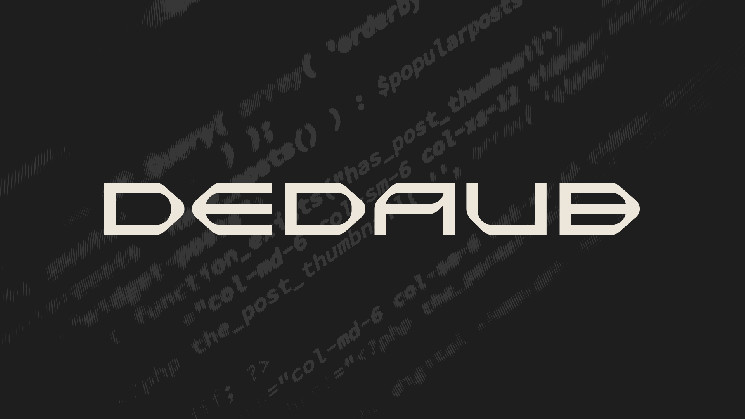Dedaub Discovers Solidity Compiler Bug

Dedaub, a leading blockchain security auditing firm, has uncovered a Solidity compiler bug that affects function equality and provides insight into its mechanics and planned resolution.
The Dedaub team recently announced the discovery of a bug in the Solidity compiler that affects function equality. According to the team, the bug has been confirmed and is expected to be fixed in the upcoming Solidity 0.9 release.
In a detailed Twitter thread, Dedaub explained the mechanics behind the bug, its impact on function compilation, and the steps being taken to address the issue.
The Dedaub team has discovered a Solidity compiler bug that breaks equality, with functions.
The bug has been confirmed and is expected to be fixed in Solidity 0.9
Let’s deep-dive into the mechanics behind this bug, function compilation, and how it’s being fixed.
? pic.twitter.com/kkup7SBfSV
— Dedaub (@dedaub) April 4, 2023
Solidity, the primary programming language for writing smart contracts on the Ethereum blockchain, supports higher-order functions. This means that functions can operate on other functions themselves. The implementation of function pointers in Solidity is closely tied to the underlying implementation of functions, with bytecode offsets of the first instruction being used as function identifiers.
The discovered bug is related to the Solidity compiler’s optimizer, which performs semantics-preserving transformations to save gas. One such transformation involves reusing common sequences of instructions. The issue arises when the first part of a function contains a common sequence of instructions, causing function pointers to potentially point to another function entry and conflating their identifiers.
This bug is considered a rare, isolated case, as most smart contracts do not use function pointer equality. Developers can work around the issue by disabling optimizations in the meantime. The Solidity team plans to disable function pointer equality in the upcoming Solidity 0.9 release, effectively addressing the bug.
Dedaub has stated that they are not aware of any instances of function equality being used in known protocols. The discovery of this bug highlights the importance of ongoing research and collaboration between code auditors and developers to maintain the security and integrity of the blockchain ecosystem.
Solidity, the primary programming language for writing smart contracts on the Ethereum blockchain, was initially proposed by Ethereum co-founder Gavin Wood in 2014. Solidity was designed to be a high-level, statically-typed language inspired by C++, Python, and JavaScript. It was created specifically to facilitate the development of smart contracts on the Ethereum platform.
Solidity’s development and subsequent adoption were driven by the need for a programming language that could provide a secure and reliable way to create, deploy, and interact with smart contracts on the Ethereum blockchain. The language has since undergone numerous updates and improvements to address security concerns, enhance functionality, and optimize gas usage. The continued evolution of Solidity has contributed significantly to the growth of the decentralized application (dApp) ecosystem, enabling developers to create innovative solutions across various industries such as finance, supply chain, and gaming.
As a programming language, Solidity has faced challenges in terms of security, scalability, and usability. Several high-profile incidents, such as the DAO hack in 2016 and the Parity multisig wallet vulnerability in 2017, have highlighted potential weaknesses in Solidity and the smart contracts it powers. These incidents have prompted the Solidity team, developers, and the wider blockchain community to seek improvements in the language, focusing on security and robustness.
In recent years, alternative smart contract languages, such as Vyper and Rust, have emerged as potential competitors to Solidity. Despite this, Solidity remains the dominant language for Ethereum smart contract development, with a vibrant community continuously working on its refinement and optimization.
Dedaub also discovered and made proper disclosure of a large-scale Uniswap router vulnerability earlier this year.
The discovery of the Solidity compiler bug affecting function equality is a testament to the ongoing efforts within the blockchain community to improve the language and ensure its security. As Solidity continues to mature, it is crucial for developers, auditors, and the blockchain community at large to collaborate in addressing potential vulnerabilities and enhancing the robustness of the ecosystem.
Disclaimer: This article is provided for informational purposes only. It is not offered or intended to be used as legal, tax, investment, financial, or other advice.






 Bitcoin
Bitcoin  Ethereum
Ethereum  Tether
Tether  USDC
USDC  TRON
TRON  Dogecoin
Dogecoin  Cardano
Cardano  Monero
Monero  Bitcoin Cash
Bitcoin Cash  Chainlink
Chainlink  LEO Token
LEO Token  Stellar
Stellar  Zcash
Zcash  Litecoin
Litecoin  Hedera
Hedera  Dai
Dai  Cronos
Cronos  OKB
OKB  Tether Gold
Tether Gold  Ethereum Classic
Ethereum Classic  KuCoin
KuCoin  Cosmos Hub
Cosmos Hub  Gate
Gate  Algorand
Algorand  VeChain
VeChain  Dash
Dash  Stacks
Stacks  Tezos
Tezos  TrueUSD
TrueUSD  Decred
Decred  IOTA
IOTA  Theta Network
Theta Network  Basic Attention
Basic Attention  NEO
NEO  Synthetix
Synthetix  Qtum
Qtum  Ravencoin
Ravencoin  0x Protocol
0x Protocol  DigiByte
DigiByte  Zilliqa
Zilliqa  Nano
Nano  Siacoin
Siacoin  Numeraire
Numeraire  Waves
Waves  Ontology
Ontology  Status
Status  Enjin Coin
Enjin Coin  Hive
Hive  BUSD
BUSD  Pax Dollar
Pax Dollar  Lisk
Lisk  Steem
Steem  Huobi
Huobi  OMG Network
OMG Network  Bitcoin Gold
Bitcoin Gold  NEM
NEM  Augur
Augur